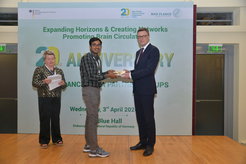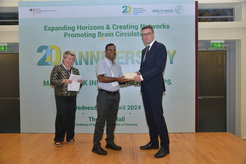Halle and India strengthen their scientific ties
20 years of the Partner Group Program in India: President Patrick Cramer welcomes two new Partner groups to the Max Planck Institute of Microstructure Physics in Halle
20 years of the Partner Group Program in India: President Patrick Cramer celebrates and welcomes two new Partner groups to the Max Planck Institute of Microstructure Physics in Halle
To mark the 20th anniversary, a delegation led by Max Planck President Patrick Cramer visited India in April 2024. One aim of the trip was to intensify existing collaborations. No other country has as many active partner groups as India: 85 partner groups have been founded in India since 2004, of which 27 were active in March 2024. Seven new collaborative Partner Groups were nominated and inaugurated in 2024. Two of these seven newly established Partner groups are at the Max Planck Institute of Microstructure Physics in Halle.

The "Max Planck Partner Groups" are an instrument created by the Max Planck Society to strengthen the ties between Max Planck Institutes and foreign research institutes and to intensify cooperation between individual scientists through jointly conducted projects.
The successful work of Dr. Binoy Krishna Hazra during his time at the NISE Department, headed by Prof. Stuart Parkin, led to his appointment as the Head of the Partner Group at the Indian Institute of Technology Guwahati. Each group will receive funding of 20.000 EUR per year for five years to establish and develop the Max Planck Partner Group into an active research group of the Indian and international scientific communities. Dr. Binoy Krishna Hazra will lead the Partner Group for “Non-volatile and energy-efficient non-collinear antiferromagnet-based memory devices” in the field of experimental condensed matter physics.

President Patrick Cramer has announced the establishment of a second new Partner Group at the Max Planck Institute of Microstructure Physics in the Department of Synthetic Materials and Functional Devices (SMFD), led by Prof. Xinliang Feng. Dr. Bishnu Prasad Biswal, reflecting on his successful work at the Institute in Halle, will take up his position as Head of the Partner Group focused on "Investigation of Light-Matter Interaction in Crystalline Polymer Thin Films and Membranes". The research will be conducted and established at the National Institute of Science Education and Research (NISER) Bhubaneswar in India in the field of Polymer materials.
"I have known Dr. Biswal since 2016 when he was a postdoctoral researcher in my group at the Technical University Dresden. He worked with us for over a year before moving to the Max Planck Institute for Solid State Research in Stuttgart as an Alexander von Humboldt postdoctoral fellow under the supervision of Prof. Bettina Lotsch.", adds Prof. Feng.
The Max Planck Society is supporting both projects for five years starting in June 2024. The funding will finance staff positions and establish comprehensive doctoral training in India. We are pleased to contribute to this successful 20-year scientific cooperation.
Summary of the Partner Group research activities
“Non-volatile and energy-efficient non-collinear antiferromagnet-based memory devices”
Non-collinear antiferromagnets (NC-AFMs) are the class of magnetic materials where net magnetization is either zero or nearly zero. NC-AFMs can enhance the data density in memory devices due to zero stray fields. In addition, the magnetization dynamics of NC-AFMs belongs to THz which is much faster than the GHz magnetization dynamics of ferromagnets. In this proposal, we will focus on the generation of out-of-plane polarized spin current from NCAFMs and use it to manipulate electrically another NC-AFMs for energy-efficient and nonvolatile data storage devices.
"Investigation of Light-Matter Interaction in Crystalline Polymer Thin Films and Membranes"
The proposed project is in the field of two-dimensional (2D) polymeric materials that have sparked significant research interests in the last few years in terms of synthetic methodologies and potential applicability. We intend to develop new interfacial synthesis approaches for the construction of crystalline 2D polymer thin films and self-standing membranes. The effect of structural modularity, stemming from the vastness of reticular structure design and 2D polymerization methods, on how these materials interact with light of THz frequency will be investigated with the purpose of evaluating the fundamental physical properties of dynamic ground state conductivities and studying their applicability in molecular recognition.













